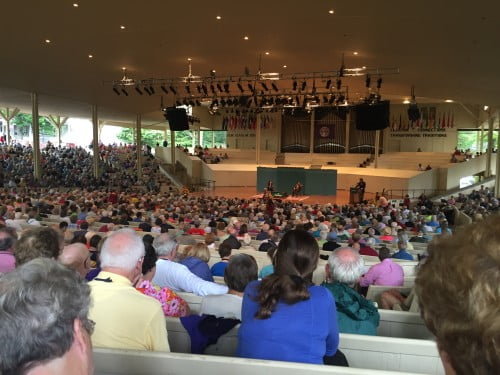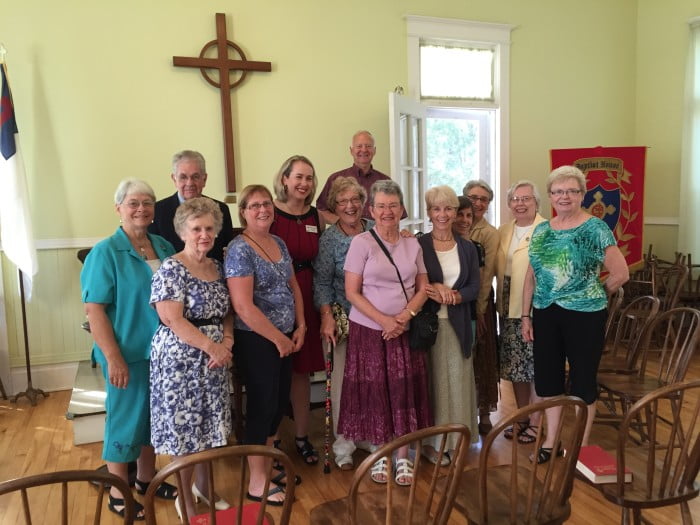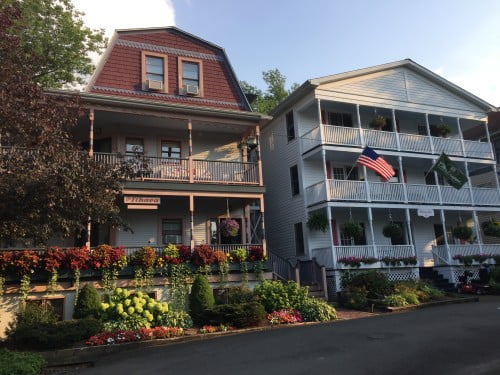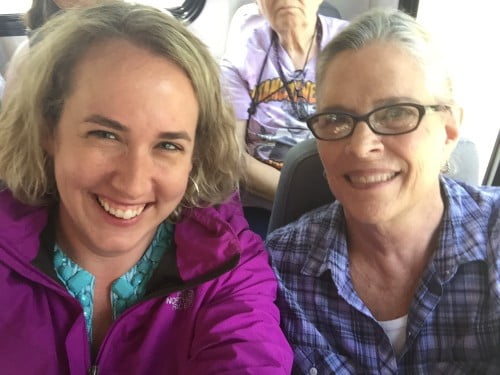In the spirit of being a "Preacher on the Plaza," how fun it was to be the Chaplain at the Baptist House of Chautauqua Institute last week in New York! (I will always travel to preach!)
If you aren't familiar with the Chautauqua Institute (as I wasn't before this, my first visit), it's a center for education, inter-religious dialogue and the arts in existence since 1874. Founded originally as a center for ecumenical conversation and training for Methodist Sunday School teachers, Chautauqua has evolved since its earliest days. Today it's a place where thousands of open-minded pilgrims gather during the 9 week summer season for study, friendship and hope about how we can all do our part to bring about justice and healing in the world.
On any given day at Chautauqua during the summer, you could attend a lecture in the morning by leading professional or media personality, take a sailing lesson at lunch, hear a chamber music concert in the afternoon, and watch a ballet performance in the evening with 5,000 of your new friends. (Yes, all in one day!)
 The theme of last week was the Middle East Now and Next. I heard so many lectures that both made me want to wept at the state of American foreign policy but also introduced me some of the most creative peacemakers that spoke with hope!
The theme of last week was the Middle East Now and Next. I heard so many lectures that both made me want to wept at the state of American foreign policy but also introduced me some of the most creative peacemakers that spoke with hope!
And, in this blog post I could tell you how much I learned about movements for peace in places like Egypt, Iran and Iraq.
Or I could tell you how fun it was to preach on Sunday and a led a lecture at the Baptist House gatherings. 
Or I could tell you about the beauty of the historic cottages and the gardens without end!

Or even how I got to experience all of these things with a great friend.

But as is the case with me and most big experiences like this, what I take away is usually not something that was specifically on the agenda.
I thought about how the things that most of us really, really want out of life are things we're afraid to ask for or think is really at all possible.
I thought about how fear of being rejected at our deepest level often keeps joy out--- the kind of joy that could chart our paths on less anxious places.
I thought about how scary it is to say, "I'm THE one for this task" or "This is what I want/ need from you" Or "I need to tell you something." But, in fact, these are the words that do usher in salvation.
These are two of the prolific writers and spiritual thinkers of the 20th century who'd I'd thought a lot about in seminary, but not much since. I'd forgotten about the bravery that flows from their musings.
So, I was thankful to rediscover these words from Nowuen's book, The Inner Voice of Love about courage:
"Do not hesitate to love and to love deeply. You might be afraid of the pain that love can cause. When those you love deeply reject you, leave you, or die your heart will be broken. But this should not hold you back from loving deeply . . . You will discover that the more love you can take in and hold on to, the less fearful you will become."
I was thankful to hear these words attributed to Merton again:
“You do not need to know precisely what is happening, or exactly where it is all going. What you need is to recognize the possibilities and challenges offered by the present moment, and to embrace them with courage, faith and hope.”
And so, I arrived at home on Saturday night feeling all the more vulnerable, but all the more delighted by the gift of courage.
Courage to be present in the moment exactly as it is.
Courage to dream past my excuses.
Courage to feel like my heart might come out of my chest as joy settles in (but that's ok).
Life is full of surprises, isn't it?
Thank you Chautauqua for a week of so many gems and especially a new tan full of new courage!
 It is a popular question to ask pastors or religious leaders in general: "How do I know God's will for my life?" or "How can I know what God wants me to do?" Just as folks go to the doctor to figure out what is wrong with them when they are sick, it's pastors that suddenly get so popular when life's confusing crossroads hit.
It is a popular question to ask pastors or religious leaders in general: "How do I know God's will for my life?" or "How can I know what God wants me to do?" Just as folks go to the doctor to figure out what is wrong with them when they are sick, it's pastors that suddenly get so popular when life's confusing crossroads hit.
For me, when I get asked questions like this, I usually feel inadequate (not because I didn't go to seminary or take lots of pastoral care classes) but because it is as if the questioner is asking me to play the role of God in their life, telling them what they are to do as they face difficult decisions.
At heart, I see the role of a pastor to be that like a spiritual director, but even a deeper relationship than that a counselor has with their clients: an intentional relationship between a people and one called out to lead of figuring out what it means to find the presence of God in community. And so, the pastor still serves in the role of learner as much as he or she does as teacher. Thus, for any pastor to give a specific answer to "This is what God wants from you" with complete authority can often be off base and misstated. One of my favorite prayers from Thomas Merton speaks of the fact that as much as we think we are doing God's will, we may not be.
So, if even pastor types can not speak definitively for God with absolute certainty, then how can we know? How can we discern God's steps for us when we reach junctures of big decisions?
I would have once answered this question by saying large amounts of time need to be offered up to God sitting quietly in the woods or taking residence in prayer closets. I would have said that if you diligently search the scriptures, an answer from the pages would come. Or, I would have said that if the decision leads to more folks coming to know of Christ, then of course it was the right one (can you tell I used to be an evangelical?).
But, as I've grown in faith, I've come to see a way of discernment that doesn't always have to include words shouted from the heavens with my name in them or having moments of great epiphany in prayer. It's actually much more messy than this. Sometimes as much as we think we know, we don't. My spiritual director always says meaning is revealed (to which I find frustrating of course).
Sometimes, actually often times, discernment for me now looks like the simple practice of putting one step in front of another and seeing what comes. Knowing that as I go down a path, the Spirit can be trusted to show me where I am to be and where red flags are shouting "stay away, go the other direction."
Sometimes discernment comes in a word of a friend that I can't seem to get out of my mind.
Sometimes discernment comes as intuition that I believe from my heart that can't be shaken, no matter what occurs.
Sometimes discernment comes as pieces of a life direction falling together in ways that I know I could never dream up or orchestrate on my own even if I tried.
Though I am often not much help to those who come to me seeking "the answer" to their troubles, hopefully what I can do as a pastor, as a friend, as a wife is to listen, to say what I hear and hope for the Spirit to make clear what needs to rise up and what needs to fall away. Because after all, this is what faith community is at its best. For as much as I can be this for fellow travelers on the journey, I need the same folks to do this for me too.
What does discernment look like? It looks like me walking alongside you, you walking alongside me with open eyes, attentive feet and ears to hear "This is the way, walk in it."